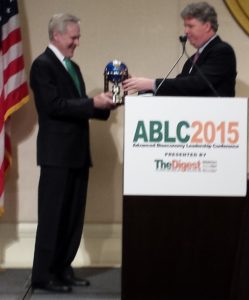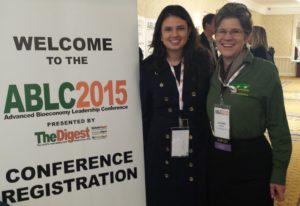by Joanne Ivancic* (Advanced Biofuels USA) Every year, the annual Washington, DC gathering of leaders in the advanced biofuels world at the Advanced Bioeconomy Leadership Conference sports a different "vibe." In the early days of the late 2000's, the atmosphere filled with optimism, visionary ideas, hope and more than hope--certainty that we would "get off of our addiction to oil" as President George W. Bush put it, and solve the problems of the world.
Tough Slog
Genera Energy's President and CEO, Kelly Tiller (far right in photo), in her presentation, illustrated her view of the life cycle of an advanced biofuels company. In doing so, she also illustrated the dynamic of the conference moods. Beginning in the early days full of naïveté, optimism, even hype; moving through realistic implementation on an upward trajectory; reaching the top of the cycle, the rollercoaster hill, where it's a tough slog; and, if the idea makes it through that, descending into consolidation and stability which lead to recognizing the need to reform; then development of new exciting ideas and back into the cycle again. She observed that the mood of the 2015 meeting was entrenched in the tough slog.
As if a general feeling of "tough slog" on the business side was not enough to bear, this community was also mourning the sudden, unexpected, untimely suicide of a beloved colleague, Guido Ghisolfi, CEO of Italy's Beta Renewables. Not only a business associate, competitor and crucial leader of technology implementation, Ghisolfi was remembered during opening remarks by a number of presenters as a particularly close friend, as an inspiration, as someone whose loss will be deeply felt on a personal level. An employee of one of his companies said during a break that even her children cried learning of this loss; their families had an informal exchange program to give the children a chance to live in each other's countries. Conference organizer, Jim Lane, presented the annual Lifetime Achievement Award posthumously to his friend, explaining that the presentation came much sooner than he would have liked.
And that wasn't all. Advanced Biofuels Association executive director Mike McAdams (seated far left in photo above) dropped a policy bomb announcing that the Advanced Biofuels Association was breaking its solidarity with the other renewable fuels trade organizations and calling for legislative reform of the Renewable Fuel Standard. As a former staffer of the organization noted the next day, the Twitterverse exploded upon that announcement; and before the conference session was over, he received tweets from friends who had no connection with the renewable fuels industry, wanting to know what was going on.
To make matters just a bit worse, the Environmental Protection Agency, the agency responsible for success-or-failure regulations affecting this industry, the agency on which all the trade organizations (even the Advanced Biofuels Association) hang their hopes for rigorous interpretation and enforcement of those regulations, refused to participate.
Navy Secretary Ray Mabus Explains Advanced Biofuels as Strategic Weapon

US Secretary of the Navy Ray Mabus receives Global Bioenergy Leadership Award from Biofuels Digest's Jim Lane.
So, heavy stuff going on. But this community (It's hard to call it an industry when so many are still "pre-revenue" or at least "pre-profit.") is used to picking itself up and moving on.
The foremost example of this, Secretary of the Navy, Ray Mabus, in his keynote address upon receiving the Global Bioenergy Leadership Award, firmly explained why we are here, making three clear points. The Navy, Marine Corps and more rely on this developing industry to 1) Diversifying fuel supplies; 2) Stabilize fuel costs; and 3) Reduce overall energy needs.
Why is this important? The urgency stems not only from economic benefits; but most important because diverse energy sources "reduce the ability of people to use access to energy as a geopolitical weapon;" reduces vulnerabilities of being overly reliant on outside sources of fossil fuel to power fleets, aircraft and more. Especially with the US Department of Defense being the "largest user of fossil fuels on Earth;" and with the Navy using one third of that. He pointed out Russia's current use of energy access as a weapon against Ukraine and Europe. And affirmed that losing one Marine for every 50 convoys bringing fuel to the military was an unacceptable price.
The goal he set for the department, 50% non-fossil-fuel use by 2020 will be reached onshore by the end of this year. 2012's Pacific Rim exercises successfully demonstrated use of biofuels in every possible application by the Great Green Fleet carrier strike group. The only difference noticed was that the renewable fuels burned cleaner than fossil fuels, didn't "gunk up the engines" as much. At sea, every one of the aircraft and ships are certified to use biofuels.
Secretary Mabus spoke of the "new normal," that the US military and all of our allies will be using fuel that is partly biobased without knowing the difference or making any special accommodations for it. In response to a question asking what this industry could do to help, he answered that the industry work on a "science project" to develop lubicating elements of the fuel so that instead of 50/50 blends, the Navy can run on 100% non-fossil-based fuels.
Attended by ambassadors and other distinguished guests (see list below), this presentation illustrated the resolve of the US Navy and maritime countries around the world, to urge development and deployment of renewable fuels. Make no mistake about it. They presented a quiet, and forceful flank of the battle to achieve that goal of "getting over our addiction to oil" and diversifying sources of energy to reduce the power of energy as a geostrategic weapon.
During breaks and during presentations, there were repeated references to the power of that simple show of force.
How to Achieve These Goals--Practical Advice
 Wilson Sonsini's Taite McDonald addresses challenges and solutions as part of one of the "Finance Summit--What's Working Best" panels.
Wilson Sonsini's Taite McDonald addresses challenges and solutions as part of one of the "Finance Summit--What's Working Best" panels.
Throughout the conference many high quality panels presented a range of perspectives or approaches on themes ranging from policy outlook to strategic perspectives to paths to scale and steady-state production, market attitudes toward IPOs, getting through the financing Valley of Death and lessons learned along the road to commercialization. At times, descriptions of company activities got tedious; but every time the speakers did pull out of the spiral to bring up the salient point or the nugget that was worth waiting for.
A unique element this year came from some companies that had made it though enough of the tough slog period that they felt comfortable talking about and even showing photos of the disasters in their past. Important on two levels. First, it was very generous of them to share these anecdotes as a way to encourage others, even potential competitors. Second, there was a feeling that as you strived to survive and thrive you were becoming a part of a very small, select club. Like going through hazing, but not simulated or pretend– very, very real.
 Corinne YOung, chief advocate for re:chem introduces discussion of US government agencies' policies.
Corinne YOung, chief advocate for re:chem introduces discussion of US government agencies' policies.
That brings up another characteristic of this annual meeting. Some people attend church retreats to spend time with people who share their daily life struggles, their aspirations and beliefs. The people making advanced biofuels happen in business, government, finance, science and communities have this conference to come together to encourage, argue, renew alliances, make philosophical stands, gather strength and throw down challenges. Yet, underlying all the competition and disagreement, an element of camaraderie, of shared purpose and shared struggle.
To make advanced biofuels happen requires many types of people who don't necessarily get along. The story at the American Chemical Society Green Chemistry Institute goes that after years of chemists meeting together, they decided to invite chemical engineers, intentionally preparing for the cultural clash. A few years later, they put their toes in the waters of the biology world by inviting Advanced Biofuels USA to exhibit and biologists to present, bridging an even greater cultural divide.
To make advanced biofuels work requires all of these science and technology worlds to merge along with the worlds of commerce, policy, environmentalism and more. Quite a stew. As a stew takes high heat for braising, some boiling and a long simmer and a variety of ingredients to reach its peak, so does the pot of advanced biofuels.
Market Factors
More ways that it's not easy? Certainly, expecting the entrenched market leader (oil) to voluntarily take its product out of the market and replace it with a renewable competitor is overly optimistic if not insane. Yet, perhaps thinking that oil companies would diversify into renewables, that's just what the Energy Independence and Security Act of 2007 (EISA) did in the Renewable Fuel Standard. It made sense to oil interests to replace fossil-based octane with cheaper ethanol-octane; but beyond there be dragons.
 Ben DeVries, Treasure Coast Education, REsearch and Development Authority CEO described involvement with the USDA/DOE/FAA/CAAFI Farm to Fly initiative.
Ben DeVries, Treasure Coast Education, REsearch and Development Authority CEO described involvement with the USDA/DOE/FAA/CAAFI Farm to Fly initiative.
So, corn ethanol secured the 10% of the market that is in the oil company's financial interest. And corn ethanol producers have less reason to give up that portion of the fuel market than oil has to relinquish its market share. More than one presenter admitted that the corn ethanol producers will protect their turf as much as the oil companies protect theirs. It’s reality. Everyone knows that they would do the same. As Mike McAdams noted, the way the RFS has been implemented favors now-entrenched corn ethanol interests.
The main market for advanced "drop-in" transportation fuel molecules is aviation, jetfuel. Talk about a tough slog. Once novel technologies, or even technologies built primarily on existing processes, achieve production, a nearly interminable approval process guarantees only the well-connected survive.
So, recognizing this reality one of the alcohol-to-jet presenters suggested that existing corn ethanol plants bolt on the ATJ technology. It makes market sense for them. With the Obama administration protecting the "blend wall" that supports a 90% fossil fuel market, the choice is to export or find other uses for the ethanol that they have capacity to produce. So, why not? Feedstock might be the limiting factor—which takes us to the question of intermediates produced away from the main multi-product biorefinery, a subject of other articles.
ABLC expanded this year, moving "beyond biofuels" to encompass the entire bioeconomy dedicating stage time to renewable chemicals. Made as a more economical way to develop technologies that may also apply to fuels once chemical markets become saturated; or created specifically for chemical markets, companies large and small made clear their intention to produce the same or better than fossil-based materials at competitive prices.
The finance gurus also had their time in the spotlight. "Tough slog" describes the message embedded in their presentations overall. From price of oil to policy uncertainty to general economic malaise, it became clear that most of the investment comes from large companies interested in diversifying into the renewable space; companies who can take a financial hit for a while as they explore innovation betting on being the leaders as a bio-based, renewable, sustainable future develops.
Feedstock--See you in New Orleans
Although a substantial portion of this conference usually covers feedstock issues, that topic area has grown so much that a full conference dedicated to exploring multiple aspects has been set for June 9-10 in New Orleans.
Marching On
Let there be no doubt about the resolve of the intrepid warriors in the battles toward a renewable, sustainable future denying unbalanced power to fossil fuel energy powers. Dedication, persistence, intelligence and faith in the value of their efforts sustains this growing industry.
 US Secretary of the Navy Ray Mabus with some of the ambassadors and distinguished guests attending the Global Bioenergy Leadership Keynote Address.
US Secretary of the Navy Ray Mabus with some of the ambassadors and distinguished guests attending the Global Bioenergy Leadership Keynote Address.
List of Ambassadors and distinguished guests, visitors from Pacific Rim and European naval allies:
- Ambassador Mirpuri of Singapore
- Ambassador Thompson of Fiji
- Ambassador Mulina of Papua New Guinea
- Ambassador Takesy of Micronesia
- Rear Admiral Sekiguchi of Japan
- Counselor Gorassen of Sweden
- Vice Admiral Francisco Perez Rico of Mexico
- Commodore Mehta, Embassy of India
- Captain Suvin Jangyodsuk, of Royal Thai Embassy
LISTEN to Secretary Mabus Global Bioenergy Leadership Keynote
Photos by J. Ivancic unless otherwise noted.
 Advanced Biofuels USA's executive director, Joanne Ivancic (right) joined volunteer correspondent Lais Thomaz who also helped staff the conference.
Advanced Biofuels USA's executive director, Joanne Ivancic (right) joined volunteer correspondent Lais Thomaz who also helped staff the conference.
*Joanne Ivancic, serves as Executive Director of Advanced Biofuels USA. She also served as a lobbyist promoting advanced biofuels research and production on Capitol Hill and with executive agencies. She has observed the development of advanced biofuels’ research and financing for more than fifteen years. From 2010 to 2013 she was voted one of the Top 100 People in Bioenergy by Biofuels Digest readers and editors.
Nearly 55,000 articles in our online library!
Use the categories and tags listed below to access the nearly 50,000 articles indexed on this website.
Advanced Biofuels USA Policy Statements and Handouts!
- For Kids: Carbon Cycle Puzzle Page
- Why Ethanol? Why E85?
- Just A Minute 3-5 Minute Educational Videos
- 30/30 Online Presentations
- “Disappearing” Carbon Tax for Non-Renewable Fuels
- What’s the Difference between Biodiesel and Renewable (Green) Diesel? 2020 revision
- How to De-Fossilize Your Fleet: Suggestions for Fleet Managers Working on Sustainability Programs
- New Engine Technologies Could Produce Similar Mileage for All Ethanol Fuel Mixtures
- Action Plan for a Sustainable Advanced Biofuel Economy
- The Interaction of the Clean Air Act, California’s CAA Waiver, Corporate Average Fuel Economy Standards, Renewable Fuel Standards and California’s Low Carbon Fuel Standard
- Latest Data on Fuel Mileage and GHG Benefits of E30
- What Can I Do?
Donate
DonateARCHIVES
- February 2026
- January 2026
- December 2025
- November 2025
- October 2025
- September 2025
- August 2025
- July 2025
- June 2025
- May 2025
- April 2025
- March 2025
- February 2025
- January 2025
- December 2024
- November 2024
- October 2024
- September 2024
- August 2024
- July 2024
- June 2024
- May 2024
- April 2024
- March 2024
- February 2024
- January 2024
- December 2023
- November 2023
- October 2023
- September 2023
- August 2023
- July 2023
- June 2023
- May 2023
- April 2023
- March 2023
- February 2023
- January 2023
- December 2022
- November 2022
- October 2022
- September 2022
- August 2022
- July 2022
- June 2022
- May 2022
- April 2022
- March 2022
- February 2022
- January 2022
- December 2021
- November 2021
- October 2021
- September 2021
- August 2021
- July 2021
- June 2021
- May 2021
- April 2021
- March 2021
- February 2021
- January 2021
- December 2020
- November 2020
- October 2020
- September 2020
- August 2020
- July 2020
- June 2020
- May 2020
- April 2020
- March 2020
- February 2020
- January 2020
- December 2019
- November 2019
- October 2019
- September 2019
- August 2019
- July 2019
- June 2019
- May 2019
- April 2019
- March 2019
- February 2019
- January 2019
- December 2018
- November 2018
- October 2018
- September 2018
- August 2018
- July 2018
- June 2018
- May 2018
- April 2018
- March 2018
- February 2018
- January 2018
- December 2017
- November 2017
- October 2017
- September 2017
- August 2017
- July 2017
- June 2017
- May 2017
- April 2017
- March 2017
- February 2017
- January 2017
- December 2016
- November 2016
- October 2016
- September 2016
- August 2016
- July 2016
- June 2016
- May 2016
- April 2016
- March 2016
- February 2016
- January 2016
- December 2015
- November 2015
- October 2015
- September 2015
- August 2015
- July 2015
- June 2015
- May 2015
- April 2015
- March 2015
- February 2015
- January 2015
- December 2014
- November 2014
- October 2014
- September 2014
- August 2014
- July 2014
- June 2014
- May 2014
- April 2014
- March 2014
- February 2014
- January 2014
- December 2013
- November 2013
- October 2013
- September 2013
- August 2013
- July 2013
- June 2013
- May 2013
- April 2013
- March 2013
- February 2013
- January 2013
- December 2012
- November 2012
- October 2012
- September 2012
- August 2012
- July 2012
- June 2012
- May 2012
- April 2012
- March 2012
- February 2012
- January 2012
- December 2011
- November 2011
- October 2011
- September 2011
- August 2011
- July 2011
- June 2011
- May 2011
- April 2011
- March 2011
- February 2011
- January 2011
- December 2010
- November 2010
- October 2010
- September 2010
- August 2010
- July 2010
- June 2010
- May 2010
- April 2010
- March 2010
- February 2010
- January 2010
- December 2009
- November 2009
- October 2009
- September 2009
- August 2009
- July 2009
- June 2009
- May 2009
- April 2009
- March 2009
- February 2009
- January 2009
- December 2008
- November 2008
- October 2008
- September 2008
- August 2008
- July 2008
- June 2008
- May 2008
- April 2008
- March 2008
- February 2008
- January 2008
- December 2007
- November 2007
- October 2007
- September 2007
- August 2007
- June 2007
- February 2007
- January 2007
- October 2006
- April 2006
- January 2006
- April 2005
- December 2004
- November 2004
- December 1987
CATEGORIES
- About Us
- Advanced Biofuels Call to Action
- Aviation Fuel/Sustainable Aviation Fuel (SAF)
- BioChemicals/Renewable Chemicals
- BioRefineries/Renewable Fuel Production
- Business News/Analysis
- Cooking Fuel
- Education
- 30/30 Online Presentations
- Competitions, Contests
- Earth Day 2021
- Earth Day 2022
- Earth Day 2023
- Earth Day 2024
- Earth Day 2025
- Executive Training
- Featured Study Programs
- Instagram TikTok Short Videos
- Internships
- Just a Minute
- K-12 Activities
- Mechanics training
- Online Courses
- Podcasts
- Scholarships/Fellowships
- Teacher Resources
- Technical Training
- Technician Training
- University/College Programs
- Events
- Coming Events
- Completed Events
- More Coming Events
- Requests for Speakers, Presentations, Posters
- Requests for Speakers, Presentations, Posters Completed
- Webinars/Online
- Webinars/Online Completed; often available on-demand
- Federal Agency/Executive Branch
- Agency for International Development (USAID)
- Agriculture (USDA)
- Commerce Department
- Commodity Futures Trading Commission
- Congressional Budget Office
- Defense (DOD)
- Air Force
- Army
- DARPA (Defense Advance Research Projects Agency)
- Defense Logistics Agency
- Marines
- Navy
- Education Department
- Energy (DOE)
- Environmental Protection Agency
- Federal Energy Regulatory Commission (FERC)
- Federal Reserve System
- Federal Trade Commission
- Food and Drug Administration
- General Services Administration
- Government Accountability Office (GAO)
- Health and Human Services (HHS)
- Homeland Security
- Housing and Urban Development (HUD)
- Interior Department
- International Trade Commission
- Joint Office of Energy and Transportation
- Justice (DOJ)
- Labor Department
- National Academies of Sciences Engineering Medicine
- National Aeronautics and Space Administration
- National Oceanic and Atmospheric Administration
- National Research Council
- National Science Foundation
- National Transportation Safety Board (NTSB)
- Occupational Safety and Health Administration
- Overseas Private Investment Corporation
- Patent and Trademark Office
- Securities and Exchange Commission
- State Department
- Surface Transportation Board
- Transportation (DOT)
- Federal Aviation Administration
- National Highway Traffic Safety Administration (NHTSA)
- Pipeline and Hazardous Materials Safety Admin (PHMSA)
- Treasury Department
- U.S. Trade Representative (USTR)
- White House
- Federal Legislation
- Federal Litigation
- Federal Regulation
- Feedstocks
- Agriculture/Food Processing Residues nonfield crop
- Alcohol/Ethanol/Isobutanol
- Algae/Other Aquatic Organisms/Seaweed
- Atmosphere
- Carbon Dioxide (CO2)
- Field/Orchard/Plantation Crops/Residues
- Forestry/Wood/Residues/Waste
- hydrogen
- Manure
- Methane/Biogas
- methanol/bio-/renewable methanol
- Not Agriculture
- RFNBO (Renewable Fuels of Non-Biological Origin)
- Seawater
- Sugars
- water
- Funding/Financing/Investing
- grants
- Green Jobs
- Green Racing
- Health Concerns/Benefits
- Heating Oil/Fuel
- History of Advanced Biofuels
- Infrastructure
- Aggregation
- Biofuels Engine Design
- Biorefinery/Fuel Production Infrastructure
- Carbon Capture/Storage/Use
- certification
- Deliver Dispense
- Farming/Growing
- Precursors/Biointermediates
- Preprocessing
- Pretreatment
- Terminals Transport Pipelines
- International
- Abu Dhabi
- Afghanistan
- Africa
- Albania
- Algeria
- Angola
- Antarctica
- Arctic
- Argentina
- Armenia
- Aruba
- Asia
- Asia Pacific
- Australia
- Austria
- Azerbaijan
- Bahamas
- Bahrain
- Bangladesh
- Barbados
- Belarus
- Belgium
- Belize
- Benin
- Bermuda
- Bhutan
- Bolivia
- Bosnia and Herzegovina
- Botswana
- Brazil
- Brunei
- Bulgaria
- Burkina Faso
- Burundi
- Cambodia
- Cameroon
- Canada
- Canary Islands
- Caribbean
- Central African Republic
- Central America
- Chad
- Chile
- China
- Colombia
- Congo
- Congo, Democratic Republic of
- Costa Rica
- Croatia
- Cuba
- Cyprus
- Czech Republic
- Denmark
- Dominican Republic
- Dubai
- Ecuador
- Egypt
- El Salvador
- Equatorial Guinea
- Estonia
- Eswatini/Swaziland
- Ethiopia
- European Union (EU)
- Fiji
- Finland
- France
- French Guiana
- Gabon
- Georgia
- Germany
- Ghana
- Global South
- Greece
- Greenland
- Grenada
- Guatemala
- Guinea
- Guyana
- Haiti
- Honduras
- Hong Kong
- Hungary
- Iceland
- India
- Indonesia
- Iran
- Iraq
- Ireland
- Israel
- Italy
- Ivory Coast
- Jamaica
- Japan
- Jersey
- Jordan
- Kazakhstan
- Kenya
- Korea
- Kosovo
- Kuwait
- Laos
- Latin America
- Latvia
- Lebanon
- Liberia
- Lithuania
- Luxembourg
- Macedonia
- Madagascar
- Malawi
- Malaysia
- Maldives
- Mali
- Malta
- Marshall Islands
- Mauritania
- Mauritius
- Mexico
- Middle East
- Moldova
- Monaco
- Mongolia
- Morocco
- Mozambique
- Myanmar/Burma
- Namibia
- Nepal
- Netherlands
- New Guinea
- New Zealand
- Nicaragua
- Niger
- Nigeria
- North Africa
- North America
- North Korea
- Northern Ireland
- Norway
- Oman
- Pakistan
- Panama
- Papua New Guinea
- Paraguay
- Peru
- Philippines
- Poland
- Portugal
- Qatar
- Republic of
- Romania
- Russia
- Rwanda
- Saudi Arabia
- Scotland
- Senegal
- Serbia
- Sierra Leone
- Singapore
- Slovakia/Slovak Republic
- Slovenia
- Solomon Islands
- South Africa
- South America
- South Korea (Republic of Korea)
- South Sudan
- Southeast Asia
- Spain
- Sri Lanka
- Sudan
- Suriname
- Sweden
- Switzerland
- Taiwan
- Tanzania
- Thailand
- Timor-Leste
- Togo
- Trinidad and Tobago
- Tunisia
- Turkey
- Uganda
- UK (United Kingdom)
- Ukraine
- United Arab Emirates UAE
- Uruguay
- Uzbekistan
- Vatican
- Venezuela
- Vietnam
- Wales
- Zambia
- Zanzibar
- Zimbabwe
- Marine/Boat Bio and Renewable Fuel/MGO/MDO/SMF
- Marketing/Market Forces and Sales
- Opinions
- Organizations
- Original Writing, Opinions Advanced Biofuels USA
- Policy
- Presentations
- Biofuels Digest Conferences
- DOE Conferences
- Bioeconomy 2017
- Bioenergy2015
- Biomass2008
- Biomass2009
- Biomass2010
- Biomass2011
- Biomass2012
- Biomass2013
- Biomass2014
- DOE Project Peer Review
- Other Conferences/Events
- R & D Focus
- Carbon Capture/Storage/Use
- Co-Products
- Feedstock
- Logistics
- Performance
- Process
- Vehicle/Engine/Motor/Aircraft/Boiler/Ship
- Yeast
- Railroad/Train/Locomotive Fuel
- Resources
- Books Web Sites etc
- Business
- Definition of Advanced Biofuels
- Find Stuff
- Government Resources
- Scientific Resources
- Technical Resources
- Tools/Decision-Making
- Rocket/Missile Fuel
- Sponsors
- States
- Alabama
- Alaska
- Arizona
- Arkansas
- California
- Colorado
- Connecticut
- Delaware
- Florida
- Georgia
- Hawai'i
- Idaho
- Illinois
- Indiana
- Iowa
- Kansas
- Kentucky
- Louisiana
- Maine
- Maryland
- Massachusetts
- Michigan
- Midwest
- Minnesota
- Mississippi
- Missouri
- Montana
- Native American tribal nation lands
- Nebraska
- Nevada
- New Hampshire
- New Jersey
- New Mexico
- New York
- North Carolina
- North Dakota
- Ohio
- Oklahoma
- Oregon
- Pennsylvania
- Puerto Rico
- Rhode Island
- South Carolina
- South Dakota
- Tennessee
- Texas
- Utah
- Vermont
- Virginia
- Washington
- Washington DC
- West Coast
- West Virginia
- Wisconsin
- Wyoming
- Sustainability
- Uncategorized
- What You Can Do
tags
© 2008-2023 Copyright Advanced BioFuels USA. All Rights reserved.






.jpg)





0 COMMENTS
Leave A Comment
Your Email Address wiil not be Published. Required Field Are marked*